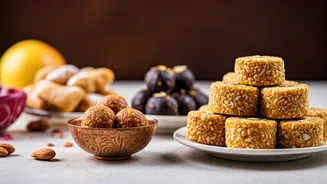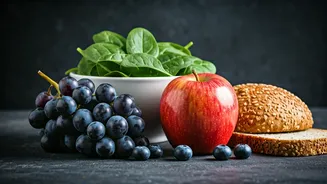Diwali Sweet Dilemma
Diwali is synonymous with joy, light, and of course, a plethora of sweets. From the rich ghee-laden barfis to the syrupy jalebis, the variety is tempting.
However, this festive season is also a time to consider the nutritional impact of these treats. Many traditional Diwali sweets are high in sugar, saturated fats, and calories, which can lead to rapid weight gain, increased blood sugar levels, and other health concerns if consumed in excess. It's important to understand the balance between celebration and health. Nutritionists often advise people to enjoy the festivities responsibly. It's about making conscious choices rather than completely depriving oneself of the festive treats. Instead, focus on portion control, choosing healthier alternatives, and staying active to counterbalance the added calories.
Risks of Heavy Sweets
The consumption of traditional Diwali sweets often comes with associated health risks. The high sugar content in many of these sweets can cause a sudden spike in blood glucose levels, particularly dangerous for individuals with diabetes or pre-diabetes. Regular consumption of foods with high amounts of saturated fats, found in ingredients like ghee and oil, can increase cholesterol levels, raising the risk of heart disease. Furthermore, the excessive calorie intake from these treats contributes to weight gain, which can exacerbate existing health issues and increase the risk of developing new ones. People should be particularly cautious if they have underlying health conditions, such as cardiovascular disease, or are at risk of developing such conditions. Awareness of these risks is the first step toward making informed choices during Diwali.
Healthy Sweet Alternatives
Fortunately, enjoying Diwali sweets doesn't mean sacrificing health. Numerous healthier alternatives can satisfy your sweet cravings without the drawbacks of traditional recipes. Consider options like sweets made with jaggery or dates instead of refined sugar, which provides some nutrients. Reduce the amount of ghee and oil used in preparation. Explore incorporating whole grains, nuts, and seeds, which add fiber and healthy fats. Another smart option is to choose sweets that are baked rather than fried. This can significantly reduce the fat content. Look for recipes that use fruits for natural sweetness and flavor. Some examples include fruit-based desserts, low-fat kheer, or sweets made with oats and nuts. Focus on recipes that are not only delicious but also offer some nutritional benefits, like protein or vitamins.
Portion Control Matters
Even if you choose healthier sweet options, portion control remains crucial. It's easy to overindulge during the festive season, leading to excessive calorie intake and potential health consequences. Plan your treat consumption. Decide how many sweets you'll have per day or per meal and stick to your plan. Try to share sweets with others, which can help limit your intake. Focus on savoring each bite rather than rushing through your treats. Slow down and truly enjoy the flavors and textures of the sweets. One smart trick is to eat smaller portions. Use smaller plates and bowls to create the illusion of a full plate. This can psychologically help you consume less food. Moreover, drinking plenty of water between sweet servings can also help to avoid overeating.
Balancing Diet, Activity
Diwali festivities shouldn't be only about sweets; integrating physical activity and a balanced diet helps to offset the impact of any indulgences. Maintain regular exercise throughout the festive period. This could include daily walks, yoga, or any other physical activity you enjoy. If possible, increase your activity level during the festival to burn off extra calories. Make an effort to eat a well-balanced diet that includes plenty of fruits, vegetables, lean proteins, and whole grains. This provides essential nutrients and helps to regulate blood sugar levels. Keep in mind that a balanced diet also helps in better digestion and general well-being. Plan your meals. Prepare healthy meals in advance to avoid last-minute choices. Also, eat your meals at regular intervals to regulate your hunger and avoid overeating.




















